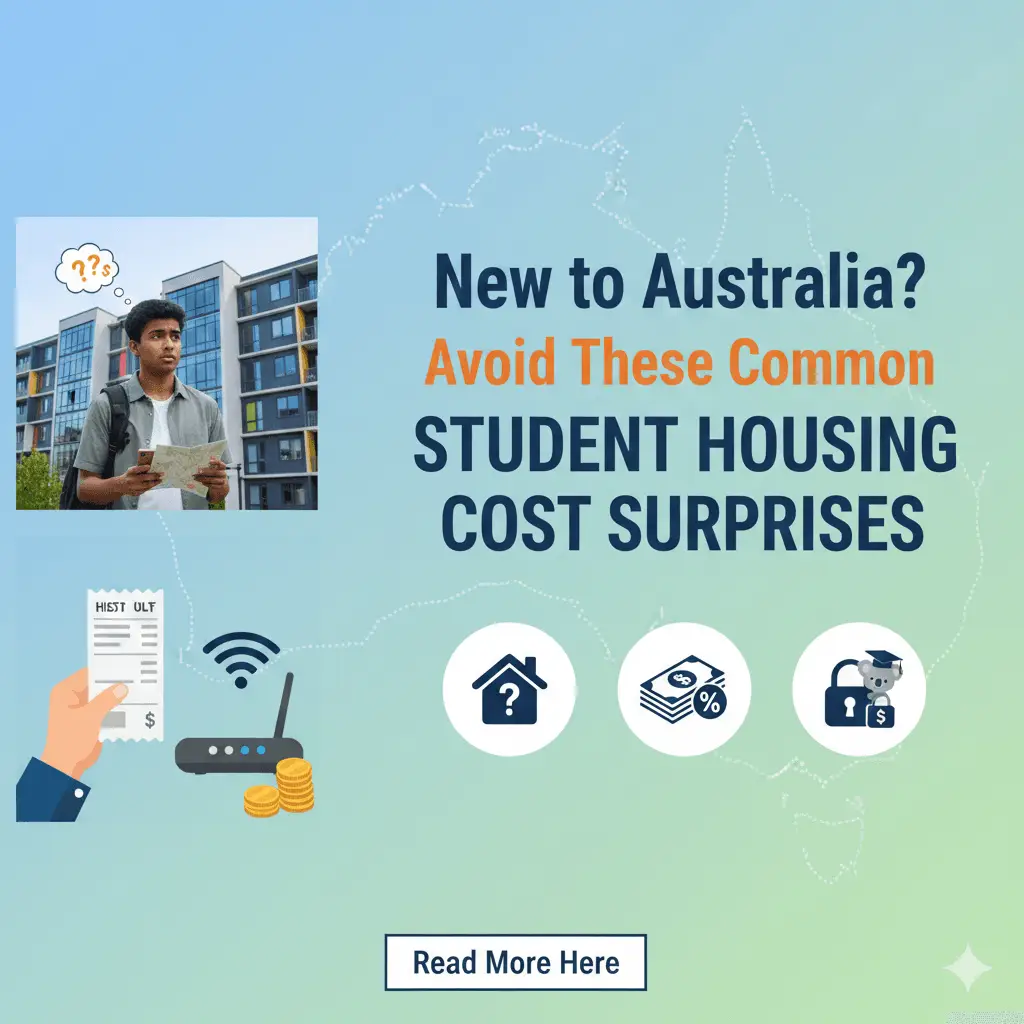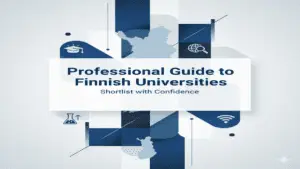#GUEST POST

Going to Australia for study purposes is not the only expense you will have. Many students discover too late that their student accommodation in Australia comes with quite a few add-ons like bonds, utility bills, setup costs, and even lease penalties.
These Australian accommodation hidden costs may seem small, but together they can shake your budget fast. Knowing what to expect before signing that lease helps you plan better and avoid those “wait, what fee?” moments later. Let’s break down what most students miss & how to keep your finances under control while studying Down Under.
Bond or Security Deposit
Here’s the part most students don’t think about till they see the invoice. Before you even get the keys, you’ll be asked to pay a bond or security deposit. It usually includes four to six weeks of rent, which is around AUD 1,200 and AUD 2,500. Though it does vary based on the city and the type of property. But when it comes to student accommodation in Australia, rent is on the pricier side.
This amount is held by a state tenancy authority and acts as insurance against property damage or unpaid rent. To get your bond back, you must make sure:
- Leave your room and furniture in good condition.
- Pay every rent instalment on time.
- Give proper notice before moving out.
Setup & Furnishing Costs
A lot of student accommodation in shared houses or private rentals comes unfurnished, meaning no bed, no study desk, and not even a kettle. Setting up your space can quickly eat into your savings. On average, expect to spend AUD 700–1,200 just to get the basics. And if you want to save a bit:
- Check Facebook Marketplace or local op shops to find secondhand things.
- Many students find their accommodation in cities like Brisbane or Adelaide through swap groups. Here, seniors sell cheap furniture during graduation season.
First Month’s Rent Upfront
Another Australian student accommodation hidden cost is that you are most likely going to pay your first month’s rent upfront. That’s easily a few thousand dollars in one go, especially if you’re converting from INR, USD, or CNY.
- For example, if your weekly rent is AUD 350, you’ll pay AUD 1,400 upfront just for the first month, plus the bond. So, make sure you have enough ready in your Australian bank account.
- If you are booking your student housing through University Living, you will know that these payments are secure and protected under the law.
Utilities
Many private rentals and shared student housing exclude utilities. This means that you will be paying extra for electricity, gas, water, & internet. This means you can add AUD 30–60 per week to your total. The cost of living for a student living in air-conditioned Australian student accommodation means your bills will cross AUD 200 a month during peak seasons. And that is why, before signing your lease, double-check what’s included.
Council Rates and Maintenance
In certain off-campus rentals, landlords pass these costs on to tenants. This adds another AUD 10 – 20 per week. It’s not much on paper, but it does take your budget over a semester. It is always important to ask for a clear breakdown of rent components before signing. It’s your right under Australian tenancy law.
Transport and Time Cost
Living far from campus might save you AUD 50 a week in rent, but you’ll probably spend that (and more) on commuting. Students in big cities like Melbourne, Sydney, or Perth spend an average of AUD 40–70 weekly on public transport passes or fuel.
- Over a year, that’s easily AUD 2,000–3,000. And let’s be honest, a 45-minute train ride after a late-night session? Not ideal.
- When comparing student accommodation in Australia, consider balancing cheaper suburbs with travel time and accessibility.
Unexpected or Penalty Fees
Some fees don’t show up till you make a mistake, make a late rent payment, lose a key, or call maintenance for something you broke. Agencies may charge AUD 50–150 for these small issues. Also, avoid signing leases with Australian student accommodation hidden costs or “cleaning fees.” They might seem minor, but they stack up fast.
Overcrowding & Hot-Bedding
Now it is one of the rarely talked about expenses, but it is one of the biggest in Australian student accommodation, and it doesn’t always involve money. Some international students, trying to save on rent, end up in overcrowded apartments.
- Or worse, they go for hot-bedding, where two or more people literally share the same bed in shifts.
- Sure, it’s cheaper for a few weeks, but the trade-off? Poor sleep, zero privacy, constant stress, & in some cases, serious health issues.
Legal & Lease Termination Fees
Lease termination & legal fees are one of the most overlooked Australian accommodations’ hidden costs. If you decide to move out early or swap rooms without written consent, you could face serious penalties. Some landlords charge termination fees, while others deduct your bond entirely. Before signing any rental agreement, take a few minutes to read the agreement. Ask questions like:
- “Is there a break clause?”
- “Can I transfer the lease if I move cities?”
- “What’s the penalty if I leave early? ”
Keep everything in writing & use official channels for any communication. It might feel tedious, but being clear up front will save you hundreds later.
Conclusion
Australia’s student lifestyle is amazing, but only if you know what you’re paying for. From deposits & transport to cleaning fees & contract fines, student accommodation comes with more than just rent. Read every clause, ask what’s included, and keep everything in writing.
And if you want safe, verified options with transparent pricing, check out University Living. Here you will find trusted student accommodation in Australia. Stay informed, budget wisely, & you’ll enjoy your time abroad without the sting of hidden costs.
To explore more about Australia, click here or contact IMFS for more details
FAQs
1. What are the most common hidden costs in student accommodation in Australia?
Many international students assume that rent covers everything, but several additional expenses can significantly increase your monthly budget. These include the bond or security deposit, rent paid in advance, electricity and gas charges, internet setup fees, and cleaning or exit charges when you move out. Some places also require payment for furniture or appliance replacements, parking, strata fees, or even maintenance call-outs. Understanding these hidden costs upfront helps prevent unexpected financial stress during your stay in Australia.
2. How much is a bond, and how does it work?
A bond is a refundable security deposit that landlords require to protect against damage, unpaid rent, or breaches of the rental agreement. In most Australian states, the bond is typically equal to four weeks’ rent, but in some cases it may be higher depending on the property. Once paid, the bond is lodged with the state’s rental bond authority—not kept by the landlord. You will receive it back at the end of your tenancy, provided the property is clean, undamaged, and all rent and bills are fully paid.
3. Are utilities (electricity, gas, water) usually included in rent?
Utility inclusions vary widely depending on the type of accommodation. Purpose-built student housing often includes electricity, water, and sometimes internet, which makes budgeting easier. However, in private rentals, tenants usually pay for electricity and gas separately, and the internet is almost always an additional cost. Water may be included in rent or charged based on usage. Always review the lease to confirm exactly what is included and what you will be responsible for paying.
4. Will I need to pay rent in advance?
Yes. In Australia, it’s standard practice for landlords or property managers to request rent in advance, usually two weeks but sometimes up to four. This payment is made at the time of signing the lease and is separate from the bond. Rent in advance is not refundable, but it is applied to your upcoming rental cycle. Students should include this in their initial arrival budget to avoid last-minute financial pressure.
5. Do I need contents or renters’ insurance as a student?
Contents insurance isn’t legally required, but it’s strongly recommended for international students. Student accommodation—especially shared units—can be vulnerable to accidental damage, theft, or loss. Contents insurance protects your belongings such as laptops, phones, study materials, clothes, and electronics. The cost is often low compared to the value of the items you are protecting, making it a smart and affordable safeguard.
6. What are break-lease fees, and how can I avoid them?
If you need to leave your rental before your lease ends, you may be required to pay break-lease fees. These can include paying rent until a new tenant is found, covering advertising or reletting fees, or paying a fixed percentage of the remaining rental amount, depending on state laws. To avoid these charges, try negotiating a flexible lease term before signing, look for short-stay student housing, or ensure you have a replacement tenant ready if you must move out early.
7. Are there extra fees for Internet, TV, or connection/setup?
Yes. The Internet is rarely included in private rentals, and students often need to arrange their own plan, which may involve installation fees, modem costs, or connection charges. Some buildings require NBN (National Broadband Network) setup, which can add to initial expenses. Purpose-built student accommodations may include Wi-Fi, but the speed or data limits might not meet every student’s needs—so it’s worth checking this in advance.
8. What should I check in the lease to avoid surprise charges?
Before signing, carefully examine your lease to understand all financial responsibilities. Check who pays for utilities, how much the bond is, and the exact conditions under which it may be deducted. Review clauses about cleaning, damage, pets, guests, and maintenance call-outs. Pay special attention to break-lease terms and any fees related to parking, strata management, or shared facilities. A thorough review now can save you money and trouble later.



